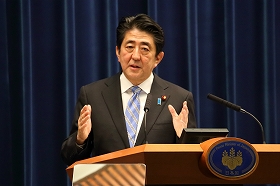 Source: www.j-cast.com
Source: www.j-cast.com This would be the second time that Abe has made a fairly dramatic statement after returning from Australia, the first obviously being his resignation from the position of prime minister in 2007 following his visit to Sydney for APEC, citing ill health as the reason. Almost as soon as he had touched down at Narita on Monday last week Abe was quickly summoning aides to the PM residence to relay his plans to hold a Lower House election early next month. On Friday last week, PM Abe took his plan to the Diet and announced the dissolution of the Lower House and the start of the campaigning season, all of which will culminate in voting on December 14.
For foreign observers, all this happened very quickly and seemingly without logic. Throughout the week a range of Japan policy experts have been giving their analyses as to why Abe suddenly needed to hold an election when the LDP-Komeito already has majorities in the Upper and Lower Houses and when it is two years out from a scheduled election. Rikki Kersten’s analysis was particularly poignant when she compared the official justification for the election (a delay in the increase to the consumption tax rate from 5 to 8%) with the more probable reason that in the wake of an announcement that as Japan had yet again gone into recession and wages were not growing, rural voters were feeling all the effects of Abenomics but none of the benefits. To increase consumption tax when consumption itself is low is a self-defeating policy, hence Abe may have felt that if he wanted to press ahead with the tax, he needed a public mandate for it.
Yet that still doesn’t answer the question of why he would have to go to an election to do it? Surely it would be far easier to merely delay the increase in tax using the LDP’s pre-existing majority in the Diet. This is where other factors have come into play. First is the rather disastrous cabinet re-shuffle that Abe attempted back in September, only to find most of his appointees having to resign their positions after their financial misdeeds were exposed in the media. This is a sensitive point for PM Abe, seeing as it was similar scandals that brought down his first administration in 2007. It may be that PM Abe thought that he needed a more reliable set of ministers if he was going to press ahead with his plan of Abenomics, which is encouraging if Abe does in fact plan to bring about systematic reform to many of Japan’s economic and social structures, the third of the three arrows.
The problem is that we have no way of knowing if this is the case. It may also be that Abe merely wants to promote more construction and infrastructure projects, a traditional bastion of LDP generosity but only useful for short-term gains in rural districts. Ikeda Nobuo, in his lambasting of Abe’s justification for an early election (J), saw a more nefarious goal in Abe’s strategy – that of securing another four years in government while the opposition parties are in disarray, all the while knowing that the economy will worsen but giving voters no choice but to go along with the LDP’s economic strategy because voters themselves would have mandated it.
As Professor Kersten pointed out, perhaps this election might be a first in the history of democracies for the very fact that more than half the electorate will refuse to turn up to vote out of sheer frustration with the various parties involved (this may happen if this Nikkei Shimbun poll is any indication (J) – more than 50% of respondents wanted an outright LDP monopoly on power in the absence of any viable opposition). Moreover Abe may lose his majority in the lower house, thereby forcing him to debate in earnest whether his moves towards collective self-defence and re-starting nuclear power plants really do have the support of the electorate (at present, the Abe government has given itself the goal of 270 seats or more in order to give themselves a ‘safe majority’ (J).
 RSS Feed
RSS Feed